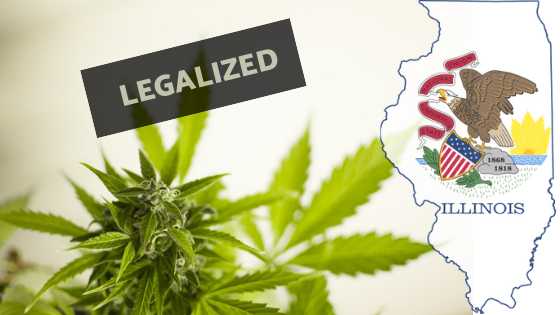The amendment to Illinois Senate Bill 7 will legalize recreational adult use cannabis in Illinois. Starting on January 1, 2020, adults over 21 in Illinois will be able to legally purchase cannabis for recreational use from licensed dispensaries across the state. This means that qualifying Illinois residents will be able to hold up to 30 grams of cannabis flower; 5 grams of cannabis concentrate; and 500 milligrams of THC contained in a cannabis-infused product, on their person, without running afoul of any state laws.
People visiting Illinois will also be able to purchase and carry cannabis and cannabis-related products, at exactly half the amount that Illinois residents are legally allowed. Finally, only those Illinois residents with a valid medical marijuana card may grow cannabis in their homes.
While the IDFPR (Illinois Department of Financial and Professional Regulation) will allow recreational sales of cannabis starting January 1, 2020, consumers will likely not be able to find a compliant storefront outside of the downtown cannabis exclusion zone established by the City of Chicago. Mayor Lori Lightfoot determined that Chicago should not allow any cannabis businesses within the densest regions of the city. The lack of open parcels created by the city’s zoning amendments, coupled with the long and drawn out zoning process in Chicago, creates a difficult business environment. Therefore, while there will inevitably be dozens of stores in Chicago by the end of 2020, they will not open in the first months of recreational cannabis becoming fully legal in Illinois. The only stores that will be open on January 1st will be in areas outside of the urban districts of Chicago, ranging from downstate, to Chicago-adjacent communities like Naperville. Thus, while there will be 75 legal dispensaries allowed to open by 2020, the likelihood that a substantial portion of them will be open in the first few months of 2020 is unlikely.
The State will impose a 7% tax for sales between cultivators and their retail clients. This will be baked into the retail cost, which will then be burdened with another 10% tax (20% for edibles and 25% for products with more than 35% THC by volume). Finally, the city and state will each impose their respective sales taxes. While the recreational tax burden will be lower than some states, notably Washington with its 37% flat tax rate, it remains to be seen if the tax regime will create an environment where consumers will choose to forgo their traditional black-market purchases.
The IDFPR allows local governments to establish consumption lounges within the larger dispensary. It remains to be seen if any municipality will actually grant permission to the dispensaries seeking it, but under the current law it is technically allowed.
This summary is not meant to be exhaustive. If you have any questions about the Illinois Recreational Cannabis Program, please contact the attorneys at Ion Law. Ion Law’s attorneys are experienced in the business and zoning regulations imposed by the City of Chicago, as well as, those codified in recent Illinois cannabis-related legislation. The complex web of competing state and local rules and regulations necessitates professional aid. Call or email Ion Law to learn more.


